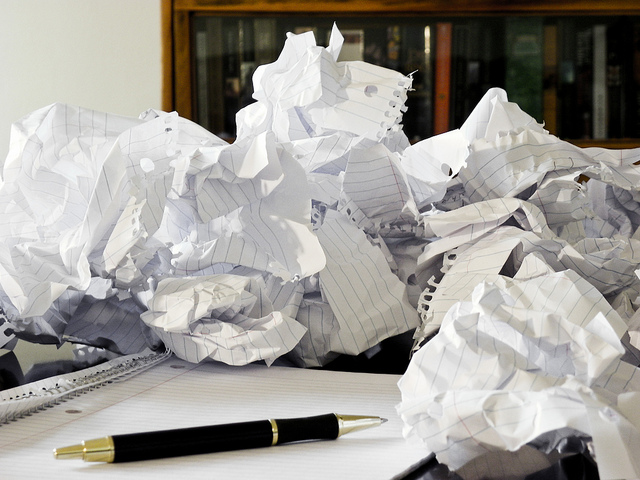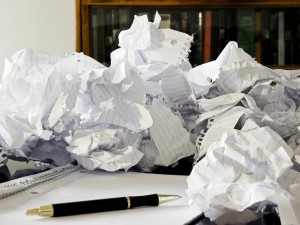 So you can’t write. For whatever reason, your ass is glued to your chair, your eyes fixed on the computer screen (or your notebook), and all you can think to yourself is “Wow. I’m fucked.”
So you can’t write. For whatever reason, your ass is glued to your chair, your eyes fixed on the computer screen (or your notebook), and all you can think to yourself is “Wow. I’m fucked.”
It’s happened to us all, my friend. The dreaded WRITER’S BLOCK. (cue the lightning strike). So I just wanted to give my personal take on where writer’s block comes from and share some tips that have helped me crush the amorphous word-killing bastard.
So let’s start with a quick intro on where writer’s block actually comes from. I call this womb of all things dark and evil the “writer’s burden”.
The Writer’s Burden
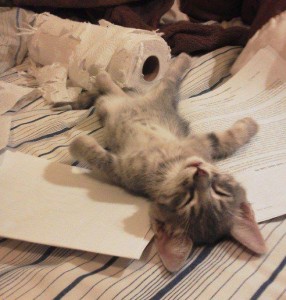 Writing. Isn’t. Easy. It’s a brave path to undertake. Not many survive it and even fewer actually try, so give yourself a loud round of applause for being brave enough (or crazy enough or stupid enough) to even give to give it a go.
Writing. Isn’t. Easy. It’s a brave path to undertake. Not many survive it and even fewer actually try, so give yourself a loud round of applause for being brave enough (or crazy enough or stupid enough) to even give to give it a go.
Good writing is hard to accomplish because there are so many different layers to it: character development, plot progression and pacing, description, dialogue, action scenes, love scenes, sex scenes, and more. Not to mention you need to make sure that 1. your narrative voice is coming through your work, 2. that it remains separate from character voice (whatever the hell that means), and 3. that, in the end, the words on the page sound less like a third grader wrote them.
It’s a LOT of pressure. In producing a good novel, we keep a lot of balls in the air, and as writers, we try our best to juggle and then catch them all in the end. Just the thought of it makes me lock up in fear, terrified to type even a single word in fear of it being wrong or just a hot mess.
Ultimately, what we seek as writers is to achieve a harmony of literary elements. What we seek as writers is perfection.
 But guess what? Literary perfection, harmony, and all that poetic BS? It’s the enemy of completion. It is the writer’s burden. And we all bear it.
But guess what? Literary perfection, harmony, and all that poetic BS? It’s the enemy of completion. It is the writer’s burden. And we all bear it.
The writer’s burden can really screw up our confidence and stall our desire to move forward. It will stand in the way of finishing our work, which is unacceptable. But even worse? It can dampen our love for our craft!
But I’m going to drop some writer’s-block-crushing-the-fuck-out-of tips that I’ve found help me in times of crisis and burden. Hopefully, you’ll find these helpful too! I’ll drop some “plotters” tips and I’ll drop some “pansters” tips. The first one is more of a “plotter’s” tip.
So what’s the first tip?
1. Create a beat sheet.
So the idea of the beat sheet originated in screenwriting, but I find it SUPER useful in helping me to write a novel with no pressure. But first, let us acknowledge the hater in the room…
____________________________________________________________
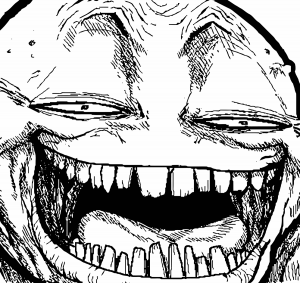 A hater’s perspective: Someone once told me that beat sheets were ONLY for screenplays and that you couldn’t write novels with beat sheets. He also said that screenplay structure and novel structure had nothing to do with one another, and that there wasn’t a single tool you could take from screenwriting to apply to novel writing.
A hater’s perspective: Someone once told me that beat sheets were ONLY for screenplays and that you couldn’t write novels with beat sheets. He also said that screenplay structure and novel structure had nothing to do with one another, and that there wasn’t a single tool you could take from screenwriting to apply to novel writing.
But that guy is a douche bag with limited perspective. And he’s only written one novel (which was poorly received), and he’s not a career novelist like we are. So he can go kick rocks with flip flops and no socks.
____________________________________________________________
ANYWAY, the reason why a beat sheet is so friggin’ awesome is because it’s so simple. A beat sheet is a bulleted list of important things that happen in a story.
Yes, literally, that is it.
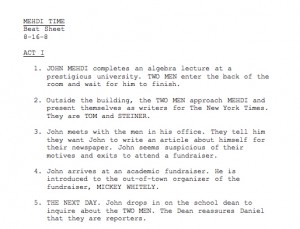 More specifically, though, a beat sheet is “a point in the scene where the character’s objectives or emotions change. It’s a point of conflict, a moment of action and reaction.”
More specifically, though, a beat sheet is “a point in the scene where the character’s objectives or emotions change. It’s a point of conflict, a moment of action and reaction.”
So to create a beat sheet, you DO need to make your bulleted list of “important things happening”, BUT these bullets have to fit the above definition if they are going to move your story forward effectively.
EXAMPLE
Scene I: Tom’s Home, Living Room, Daytime
* Tom and his wife Linda eat breakfast in stony silence (some conflict here. Why stony?)
* Linda complains that Tom is a lazy jerk (moment of action)
* Tom and Linda argue (moment of reaction & conflict), at the end Linda storms out to work (another moment of reaction)
* Tom now sits alone, grabs the newspaper on the table; sees something interesting in the newspaper. McDonald’s is hiring. (moment of action)
* Tom decides to turn life around and go get hired at McDonalds (moment of reaction, and the story moves forward. What’s next for Tom?)
END EXAMPLE
See? Things are happening in the scene, we find out a lot about the characters and their situations, and the plot is moving forward. Mind, this all might not make for the most thrilling scene, but it’s a scene. And you’ve written without having the stress of “the writer’s burden” (i.e. worrying about dialogue, pacing, description, character voice, mood, etc).
The best part about a beat sheet is that it’s easily “tweakable”. You can add little elements to your bullet points, like what exactly Tom and Linda argue about, if there are any important reveals (like Linda having an affair with the pool boy), and more. And since at this stage you’re only working with bullet points, you can rearrange points, reveals, and scenes with ease (and you don’t have to rewrite entire chapters to do it). You can add and subtract as you please!
Clearly the beat sheet is more of a preparatory tool, but when you’re finished “beating out” your novel from beginning to end, you’ve practically outlined your entire novel. Even if it’s a hot mess that’s okay, because we’re working towards Anne Lamott’s famous “shitty first draft”, which I’ll talk about in the next post!
And if this is too rigid of a writing style for you, don’t worry. Remember the beat sheet is telling us what happens, but it doesn’t tell us how. It gives us PLENTY of room to pants our way through a scene, and if you still find it too rigid for you, you can choose to use a lighter and less formal outline format. It’s all up to you!
Want more on writing beat sheets and plotting out your novel? Check out these three articles:
Plotting Out Your Novel and Screenplay #1: Story Beats and the Beat Sheet
Plotting Out Your Novel and Screenplay #2: Beginnings, Middles, and Ends
Plotting Out Your Novel and Screenplay #2.5: The BFG Beat Sheet
So this is the first tip of five I’ll be posting throughout the month on CRUSHING the FUCK out of writer’s block. Do you have any tools you use to break writer’s block? Share them below! Write on, rock on, and of course, in the meantime…
Keep it indie,
<3 Colby

